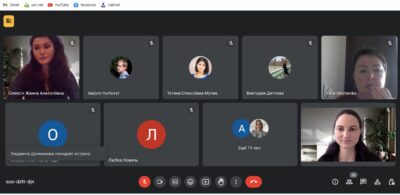Within the framework of the Jean Monnet module “EU Experiences for Enhancing Youth Employability through Professional Skills Development”, funded by the Erasmus+ program (ERASMUS – JMO -2021-MODULE -SKILLS4JOB-101047867), a series of workshops and seminars “Laboratory of ideas” – 5 events (10 hours) were held.
The events were held by the Ph.D., Associate Professor, of Accounting and Taxation Department Serpeninova Yuliia, during April – May 2023.
The purpose of these events was to raise students’ awareness of the necessary competencies to obtain additional employment opportunities in the EU market or in companies that adhere to EU standards and value systems.
During the events, Associate Professor Yulia Serpeninova discussed the practical aspects of drawing up a resume in the Europass format, writing letters of recommendation and motivation for participation in individual grant projects funded by the European Commission. Students were also given recommendations on how to improve the effectiveness of job interviews.
In addition, two events were held with the involvement of experts from Johnson Controls. One of the events focused on practical cases of human resources development in the company. The second event was devoted to the topic “Existing collaborations in the company for the purpose of sustainable development of human resources of an international corporation”.
The series of workshops and seminars proved to be very useful for the students, as it helped them to better understand the requirements of the labor market and how to improve their chances of employment in the EU. The events also stimulated the exchange of experience and cooperation between students and experts from different fields, which contributed to the expansion of their professional networking environment.
The ERASMUS+ project “EU experience in enhancing youth employability through the development of professional skills” continues to actively promote the preparation of students for international employment and provides them with opportunities to improve their skills and enrich their knowledge in line with the requirements of the modern labor market.
Funded by the European Union.However, the views and opinions expressed are those of the authors alone and do not necessarily reflect the views of the European Union or the European Executive Agency for Education and Culture (EACEA). Neither the European Union nor EACEA can be held responsible for them.





